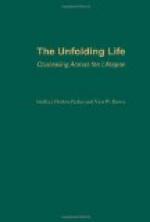Guided by instinct and impulse, responding to any wind that blows, sensitive and retentive as the plate of a camera,
“Just a-yearning
To be learning
Anything at all,”
can any religious nurture be given to this tiny little bundle of possibilities? Manifestly, it will not be through precept and admonition, for they are meaningless, yet never will life be more open to the influences of impression and atmosphere than at this time. The child can not understand their import as they come, but he will feel them. He does not understand love, but he feels it. He can not comprehend personality, but his restless little body grows quiet in the tender arms of a strong father. He responds to the fretfulness or gentleness of the mother, the noisy confusion or peace of the home. These multitudinous impressions become his life, though he can not grasp their meaning.
Just as surely does he drink in impressions which have the Divine element. What they speak to him only God knows, but some message is theirs. The picture of the “Good Shepherd,” of “Jesus Blessing Little Children,” of the “Madonna and Child,” perform their silent ministry to his soul. He is peculiarly sensitive to the reverence and worship in lofty music. In the evening tide of a Sabbath day, a father was seated at the piano, while the two older children stood near, and a wee one of two and a half years listened from his mother’s arms. The songs used in Sunday School were sung one after the other, and then came the baby voice, “Papa, sing about Dod.” “Do you mean, ’Holy, Holy, Holy is the Lord’?” he asked. “Yes,” was the answer, and in the hush of the twilight, the worship of the children blended with the worship of the angels, and who shall say they did not all behold the Father’s face?
The nurture of these years is as silent as that of the dewdrop upon the blade of grass, but it is as real. God’s voice is the still, small voice that ever speaks in quietness. The stillness of the moment at the mother’s knee, the prayer repeated in the reverent, low tone of the mother’s voice, the earnest prayer for him offered in his presence, the Christ-like living in the home, all carry their holy influence to his soul. He feels God, without knowing Him. But there shall come a day when the Voice that has gently called him will be recognized, and he will say, “Speak, Lord, for thy servant heareth.”
But general nurture must be supplemented by the definite nurture of each growing possibility. Though the principles underlying this careful watch care and training are stated in connection with Early Childhood, they are applicable to every succeeding period where the same power is developing.
PHYSICAL ACTIVITY
The most marked characteristic of the entire period of early childhood is physical activity, manifesting itself largely in restlessness. The nervous force which later will be used in complex mental processes, now seeks expression through hands and feet and tireless body.




